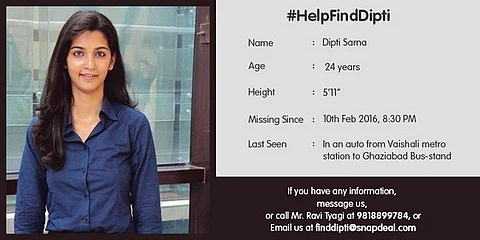

So does it require a tweet from a billionaire CEO for the media to focus on a "Missing Person" case?
Let’s at the outset make it amply clear that we are absolutely delighted to know that Dipti is back safe and sound with her family in Ghaziabad. And hats off to Kunal and his team for Snapdeal’s wholehearted involvement in keeping us abreast of the latest developments regarding Dipti’s whereabouts.
But not everyone is lucky as she is. According to statistics available with the National Crime Record Bureau (NCRB) in Delhi, 2014 saw 77237 cases of either kidnapping or abduction being registered. These are the official figures.
What about all those innumerable cases which go unreported? Why does no one tweet about them?
Even if we stick to just the official number, that makes for an astounding 21 missing persons per day of the year.
And if that is not bad enough, NCRB cites that a child goes missing every eight minutes, of whom almost 40% are not found. Some just run away from stress at home or due to misconceived perception of life imbibed form movie-dom, while many are kidnapped for human trafficking as in child prostitution, pornography, domestic or industrial labour, begging and organ transplantation.
You can read more about it in detail in a pioneering study by Bachpan Bachao Andolan (BBA) which brought out a book: Missing Children of India.
To quote from it: "There is no greater vacuum, no greater void than the helplessness felt by parents whose children have gone missing. A missing child in the Indian legal system is generally not considered a heinous crime with little attention being paid, until some time has elapsed, on recovering the child.”
Is it a case of 'as long as it’s not my loved one, I really don’t give a damn' attitude?"
Till recently, the police did not have to even register an FIR for missing children. Such official apathy, at a time when an average of one lakh children go missing every year.
It was only in 2013 that the Supreme Court issued landmark orders based on a petition filed by the BBA on the issue of missing children and trafficking, wherein a "presumption of crime" for vulnerable sections of society became law.
But an integrated country-wide database for missing people in India is yet to be formulated. Though most states have their individual tracking system in place, an inter-state coordination is yet to be streamlined. And if the missing person has been trafficked abroad, it’s an even more hopeless scenario.
Or does it require someone newsworthy- maybe from the upper echelons of society- or even the absolute opposite like an orphan who would make for a good sob story to get the requisite TRP ratings for the media to actually swing into action?
The number of missing females not surprisingly is higher compared to that of their male counterparts.
Remember the 1989 kidnapping of Rubaiya Sayeed by JKLF militants. Being fortunate enough to be the daughter of the then Union Home Minister -the late Mufti Mohammad Sayeed- the Centre did not hesitate to release five jailed dreaded terrorists in exchange for her release.
Political analysts are more or less unanimous in their assessment that this incident was what actually gave Kashmiri militants the much-needed break they were looking for in their pseudo-fight for freedom.
Coming back to our story, does the social profile of a missing person decide whether the media or the police or even the public actually join hands in tracing them and letting distraught families once and for all know their fate, whether good or bad?
In the practical handbook brought out by the International Committee of the Red Cross (ICRC) –Accompanying the Families of Missing Persons- Pascal Hundt in his forward to the book says:
"The families of missing persons live in constant anguish and despair, often waiting years for news about their loved ones. No matter how much time has passed, they find it difficult to accept, until reliable proof is provided, that their relative may no longer be alive. The uncertainty in which they have to live is the source of much suffering: it leads to emotional exhaustion and leaves lasting wounds. Not knowing what happened to a parent, spouse or child and not being able to give them a dignified burial, or to mourn their passing at a gravesite, places an intolerable burden on these families."
The book is available online .
Such families, irrespective of where they figure in the social strata, deserve the entire nation’s support in their desperate struggle for just a hint of their loved ones being alive or at least to come to terms with whatever awaits them, if worst comes to worst.
In an age where news travels at the speed of light if not faster, the media in all formats should be willing to take on the mantle of social responsibility in bringing all such cases to closure.
If there is media space for a Hrithik-Kangana affair to do the rounds, surely they can spare some space for a nationwide hunt for all such missing persons.